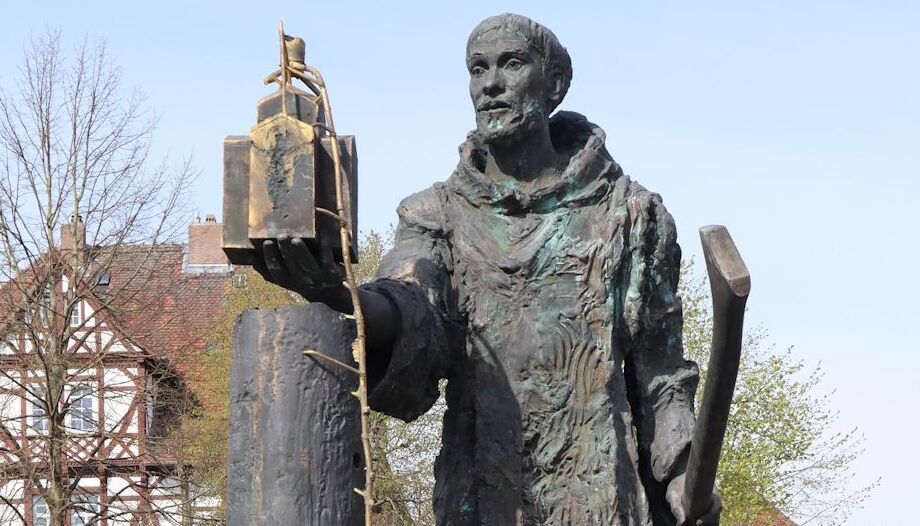The history of Christianity in Germany dates back to the 3rd century. In Trier - then part of the Roman province of Gaul - Cologne and Mainz - the capitals of Germania prima and Germania secunda - there were already Christian communities. The first historically recorded bishop in Germanic lands is Maternus, who participated as an advisor to the Roman Emperor Constantine I at the Lateran Synod in Rome in 313 and at the Synod of Arles in 314. According to the lists of the bishops of Trier, he was the third bishop of Trier, as well as the first historically attested bishop of Cologne (Civitas Agrippinensium) and possibly bishop of Tongeren.
However, the true "Apostle of the Germans" is St. Boniface (c. 673 - 754/755), who is considered the messenger of the faith to Germanic lands for having durably established Christianity in those regions. More than a missionary, Boniface was an organizer. He gave the German Church - in his time, the East Frankish Kingdom - a solid structure by creating several dioceses and founding numerous monasteries. Even today, the German bishops hold one of their two annual assemblies in Fulda, as his tomb is located in the cathedral of this city.
Boniface closed a gap of about three centuries in the historical documentation of Christianity in Germanic lands. With the fall of the Roman Empire and, in those lands, already around the year 400, the sources that could provide evidence of Christianity in the cities of Germania disappear.
While in the kingdom of the West Franks Christianity took hold after the baptism of Clovis around 500, attempts at missionary work on the right bank of the Rhine initially failed. There is hardly any source from the 7th century that mentions the Franks - already Christians - as a protective power in that region. It was not until the 8th century that Christian testimonies reappeared, a time when Boniface played a fundamental role.
Origins of St. Boniface
Originally called Wynfreth, Boniface was born around 673 into a noble Anglo-Saxon family in Crediton, in the kingdom of Wessex. He was educated as a "puer oblatus" in the Benedictine monasteries of Exeter and Nursling, where he was later ordained a priest and worked as a teacher.
His missionary activity in the Frankish kingdom and neighboring regions was part of the Anglo-Saxon missionary movement of the 7th and 8th centuries, originally promoted by Pope Gregory the Great (590-604). The aim was to Christianize the Germanic tribes and integrate them into a hierarchical ecclesiastical organization.
In 716, Boniface undertook his first missionary journey to Friesland, but failed. He returned to Nursling, where he was elected abbot. A year later he decided to leave England for good and go on pilgrimage to Rome. Pope Gregory II (715-731) entrusted him in 719 with the mission of proclaiming the Christian faith to the "unbelieving peoples" and changed his name to Boniface ("benefactor" or "one who acts well").
His mission among the Frisians was resumed, this time in cooperation with the missionary Willibrord, but the two separated in 721 due to tensions. Boniface continued his mission in the present-day regions of Hesse, Thuringia and Bavaria, where he founded several monasteries and churches. His commitment to a strict Roman Catholic church order met with resistance, especially in Thuringia.
Church organization
Much of his legacy is due to the ecclesiastical organization he undertook in Bavaria from 738 onwards. There he succeeded in establishing and reorganizing several dioceses, such as Salzburg, Friesingen, Passau and Regensburg. He also founded the dioceses of Würzburg, Eichstätt, Erfurt and Büraburg near Fritzlar. In 746 he was appointed bishop of Mainz, but his influence in Bavaria was soon eclipsed by the Irishman Virgil of Salzburg.
In the "Concilium Germanicum" of 742 he enacted strict disciplinary measures against "licentious" priests and monks. During this and subsequent synods (744 in Soissons, 745 in Mainz) the basic rules of ecclesiastical discipline and Christian life were established: the position and duties of the bishop, the ethics and behavior of the clergy, the regulation of the use of ecclesiastical goods, the renunciation of pagan customs, as well as questions of ecclesiastical marriage law.
Boniface strove to structure the Church in the Frankish kingdom according to the Roman model. His attempt to convert the episcopal see of Cologne into the metropolitan see of a new ecclesiastical province failed, however, because of resistance from the bishops east of the Rhine. Mainz only became an archbishopric and metropolitan see under his successor, Lullius.
The death of St. Boniface
At the age of over 80, Boniface undertook a last missionary journey to Friesland. Sensing his death - for he carried a shroud with him - he wanted to end his life where he had begun his mission. On June 5, 754 (or 755), he was killed near Dokkum by a group of Frisians opposed to Christian missionary work, along with eleven companions. His contemporaries regarded the circumstances of his death as an act of martyrdom. His remains were recovered by Christians, transported by ship to Utrecht and later taken to Fulda, where he was buried in the grave of his own choice.
Despite the resistance to his ecclesiastical reform, Boniface left a legacy of Christianization and organization of the Church in parts of the Frankish Empire. For this reason he is venerated as the "Apostle of the Germans" and is recognized as a central figure in European ecclesiastical history. He was canonized after his death in 754 under Pope Stephen II (752-757), and his veneration was officially sanctioned by the Pope Pius IX in 1855.







